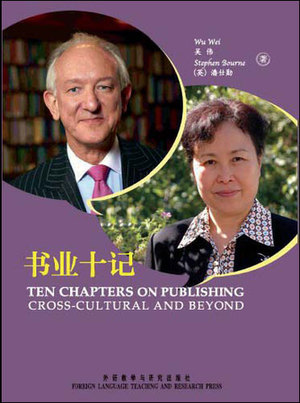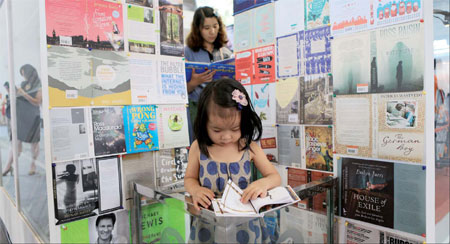Cross-cultural 'baby'
Updated: 2012-09-07 10:30
By Mei Jia (China Daily)
|
|||||||||||
|
A young reader is drawn by an English picture book at the Beijing International Book Fair. One of the highlights of the fair was Ten Chapters on Publishing: Cross-Cultural and Beyond. Cui Meng / China Daily |
A veteran British publisher and a Chinese writer share their views on the type of Chinese books that appeal to Western readers
Veteran publisher Stephen Bourne has the formula to sell a Chinese book in the West.
The Cambridge University Press president believes that if a Chinese book has faces on the cover and is written together with an established foreign author, it will more likely appeal to readers in the West.
He presented such a book at the 19th Beijing International Book Fair on Aug 30. With him was Chinese publisher and former official at the State Council Information Office, Wu Wei.
"The book is our third 'baby'," says Bourne jokingly. He has been working with Wu on the Cambridge China Library project since 2009, and has adopted a baby panda in Sichuan province.
The book, titled Ten Chapters on Publishing: Cross-Cultural and Beyond, published by Foreign Language Teaching and Research Press, is a bilingual dialogue between Wu and Bourne on 10 publishing topics.
"To me, our book cover is like a wedding invitation, featuring faces of a European man and a Chinese woman, signaling that international publishing is a constant conversation in cooperation," he adds.
Wu, with a smile that indicates her tacit agreement with Bourne's humor, says she believes the book provides food for thought to those who are interested in publishing and culture, inside and outside of China. Focusing on international collaboration and exchanges in the age of digitalization and globalization, the book offers insights into doing business in China.
 |
Its presentation style provides a refreshing precedent in the publishing industry. Zhao Qizheng, head of the Foreign Affairs Committee of the National Committee of the Chinese People's Political Consultative Conference, calls the half in English and half in Chinese book, a "perfect match".
"For years, we've seen huge volumes of publications promoting various cross-cultural dialogues, but few of them are devoted to the topic of the most important media of cultural expression - books," Zhao says.
The first thing that surprised Zhao and other readers of the book is that both Wu and Bourne share amazingly unanimous views based on their abundant international publishing experiences.
Wu started writing the book when she was serving at the information office, while working on the China Book International project. Briefly, after that, she invited Bourne to be her co-writer.
They first agreed on the 10 topics to write about. Wu would write first and send her copy to Bourne, to extend his thoughts.
There were times, the writers revealed, when Bourne started writing without reading Wu's script. But when he was done with his part and later checked with Wu, they realized that they have almost unified views and share the same principles, albeit different approaches.
They agree on the challenges of e-publishing, the function of bestsellers, and the importance of telling stories in cross-cultural exchanges.
Wu says they communicated a lot as Bourne traveled to China regularly.
"Our views on life are generally similar," Bourne says, adding that Wu's approach is largely influenced by Party ideas and Chinese philosophy, while his is more centered on life experiences and stories.
Naturally, they do not see eye-to-eye on certain matters. Wu says that's caused by the cultural differences, while Bourne adds that they differ in character: "She's sensible, and me, a little bit crazy."
The authors' first disagreement happened when they were working on their "first baby", the four-volume The History of Chinese Civilization, which was the first of the Cambridge China Library series. They had differing views on whether to keep the sections on Marxist historical theories.
In the process, Wu learnt about Cambridge's seriousness and caution. Bourne found out about Chinese authors' and publishers' emphasis on the bottom line and he tried hard to convince his peers that the publication would not compromise Cambridge's integrity. They found a solution by presenting the historical theories of various thoughts.
Wu says the library series became a hit, and more Chinese publishers are competing to have their books included.
But to Bourne, the series' aim is "making a commitment to take more books from China and to present them to the West". He says Cambridge is following the market strategy that by consistently publishing, it will make the publishing house a China expert.
"Twenty years ago, the West was deeply suspicious of China," he says. "Now, China is on high growth while Europe stops growing. Suddenly everyone wants to do business with and in China. So, they would like to know who's the China expert," he adds.
Bourne notices that Chinese publishers are changing from being shoved into the international market, to voluntarily seeking chances abroad.
Wu agrees with his views, adding that: "Lacking inner impetus to seek the international market is a setback for publishers at home."
Both also agree on the importance of qualified translators to ensure a successful global presence. Bourne suggests building a translator's market to help make it an attractive career choice.
He says getting book reviews or making it onto book lists in the West is equally important for Chinese publishers.
Wu, meanwhile, hopes Chinese writers will produce more urban stories, rather than confining themselves to the rural-themed ones they're good at, to appeal to overseas readers.
"Adding in a bit of love, a bit of sex, and a bit of crime, and a bit of everything the Westerners will love to read," Bourne says.
meijia@chinadaily.com.cn
(China Daily 09/07/2012 page30)
Today's Top News
Rescuers race against time for quake victims
Telecom workers restore links
Coal mine blast kills 18 in Jilin
Intl scholarship puts China on the map
More bird flu patients discharged
Gold loses sheen, but still a safe bet
US 'turns blind eye to human rights'
Telecom workers restore links
Hot Topics
Lunar probe , China growth forecasts, Emission rules get tougher, China seen through 'colored lens', International board,
Editor's Picks

|

|

|

|

|

|






